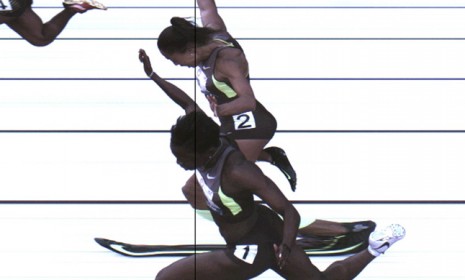The incredible tie in the 100 m race at the U.S. Olympic trial: What happens next?
Allyson Felix and Jenebah Tarmoh both crossed the finish line in 11.068 seconds — but even high-tech cameras can't pinpoint a winner, and the solution is controversial

A free daily email with the biggest news stories of the day – and the best features from TheWeek.com
You are now subscribed
Your newsletter sign-up was successful
After an unprecedentedly close race in the 100-meter dash at this weekend's U.S. Olympic trials, two sprinters' Olympic hopes may come down to heads or tails. Former Olympian Allyson Felix and up-and-comer Jenebah Tarmoh tied for third place in the race — problematic since America can send only the top three finishers to London. With no official policy in place to resolve the situation, governing body USA Track and Field (USATF) devised an impromptu tiebreaker: The two runners can either participate in a runoff or flip a coin. Here, a guide to the unusual problem and the controversial plan:
Was the race really that close?
Yep. (See the photo finish below.) The timer initially ruled that Tarmoh had finished one-thousandth of a second in front of Felix (she was even handed the mini American flag that Olympic qualifiers receive). But track officials soon revised the results, declaring that both sprinters crossed the finish line in 11.068 seconds. Two cameras capable of shooting 3,000 frames per second (one positioned on the inside of the track, the other on the outside) are used to clarify photo-finishes, according to the Associated Press, but failed to help judges pinpoint a winner in this case. (The position of the torso is used to determine the winner.)
The Week
Escape your echo chamber. Get the facts behind the news, plus analysis from multiple perspectives.

Sign up for The Week's Free Newsletters
From our morning news briefing to a weekly Good News Newsletter, get the best of The Week delivered directly to your inbox.
From our morning news briefing to a weekly Good News Newsletter, get the best of The Week delivered directly to your inbox.
And there was really no provision to deal with a tie?
Track and field is one of the few sports to lack an official protocol for handling this particular situation — a tie for the last spot on an Olympic team, says Sam Borden at The New York Times. (In swimming, for example, deadlocked opponents always compete in a swim-off.) "I've never seen anything like this," says former Olympian and NBC broadcaster Ato Boldon. "How long has this sport been around? It's crazy that there's not something very specific."
How did they come up with the tiebreaker plan?
It took nearly 24 hours after the 11-second race ended for USTAF to announce its ruling that Felix and Tarmoh will be given the option of breaking the tie with a coin toss or a runoff. And it's not as simple as it sounds, explains the Associated Press: "If both athletes choose the same option, [that option] will determine the tiebreaker. If the athletes disagree, the tiebreaker will be a runoff. If both athletes decline a preference, the tiebreaker will be a coin toss." The runners have not been given a timeline to announce their decisions, but it's expected they'll wait until after they compete in the 200-meter race later this week. According to the USATF spokeswoman Jill Geer, the tiebreaker plan was developed with input from a member of the United States Olympic Committee as well as former Olympic athletes. "Everything was considered and this was determined to be the most fair."
A free daily email with the biggest news stories of the day – and the best features from TheWeek.com
What is the reaction to this plan?
Seriously? "In the qualifying meet for a sporting event so gargantuan the planet can only handle it once every four years," the proposed solution involves a coin flip? asks David Steele at Aol. Presumably, that idea "won a narrow victory over 'one-two-three-shoot,' 'red light/green light" and 'Simon says.'" These options are cruel and unfair: Either a runoff when they're exhausted from running the 200 m, "or leave your dreams up to blind luck." But what else could we expect? asks Graham Hays at ESPN. "The situation would be no more or less fair if the tiebreaker had been on the books for a century" instead of invented on Sunday. Someone has to be declared the winner, and these options are as good as any. Either way, says Tony Manfred at Business Insider, "this whole fiasco makes USATF look really bad."
Is either idea better?
The runoff is the "only fair solution," says Sarah Spain at ESPN. It's the only option that would give the runners peace of mind. "They will either win or lose their spot, fair and square;" it won't be left to chance. But everything is made more complicated by the fact that they're both competing in the 200 m, says Jennifer O'Mahony at the U.K.'s Telegraph. "If one were to win the 200 m title, [she] might decide to exit the 100 m competition altogether." Regardless of the runners' decision, USATF owes them "an apology for putting them on an emotional roller coaster unnecessarily," says Philip Hersh at The Chicago Tribune.
Sources: Aol, AP, Business Insider, Chicago Tribune, ESPN, NY Times, Telegraph
-
 The ‘ravenous’ demand for Cornish minerals
The ‘ravenous’ demand for Cornish mineralsUnder the Radar Growing need for critical minerals to power tech has intensified ‘appetite’ for lithium, which could be a ‘huge boon’ for local economy
-
 Why are election experts taking Trump’s midterm threats seriously?
Why are election experts taking Trump’s midterm threats seriously?IN THE SPOTLIGHT As the president muses about polling place deployments and a centralized electoral system aimed at one-party control, lawmakers are taking this administration at its word
-
 ‘Restaurateurs have become millionaires’
‘Restaurateurs have become millionaires’Instant Opinion Opinion, comment and editorials of the day